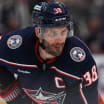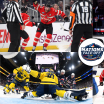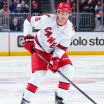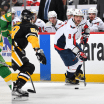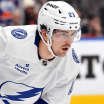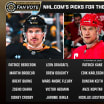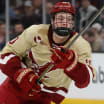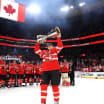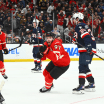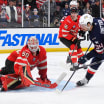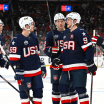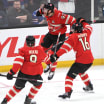Mailbag: Blue Jackets options with Laine, Islanders needs
NHL.com's Dan Rosen answers weekly questions
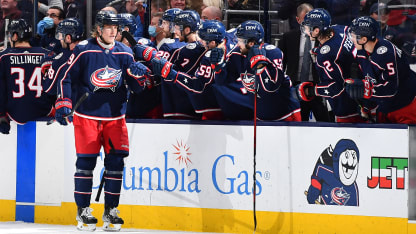
© Ben Jackson/Getty Images
Patrik Laine is on a heater. Do you trade him for a massive package or sign him to a short- or long-term contract? What would you do? -- @alehtonen_
If Laine, the Columbus Blue Jackets forward, were a pending unrestricted free agent (UFA) instead of a pending restricted free agent (RFA), this conversation would be different. Because he can be an RFA, the Blue Jackets hold his rights, and because of that it doesn't make sense to trade him before the 2022 NHL Trade Deadline on March 21 unless that massive package is available. It would have to blow the doors off anything the Blue Jackets might expect to get for Laine, who has scored 27 points (16 goals, 11 assists) in 22 games since Jan. 8.
Remember, Columbus traded a top forward, Pierre-Luc Dubois, to get Laine from the Winnipeg Jets on Jan. 23, 2021. It needs an impact player plus more assets to make this trade worthwhile, and no team contending for a spot in the Stanley Cup Playoffs is going to trade an impact player. Perhaps there could be a fit with a team that would be more inclined to make a player-for-player trade before the deadline, but I think the Blue Jackets will keep Laine and continue to attempt to agree on a multiyear contract, ideally before it gets to a salary arbitration hearing in the offseason. They can't settle for another one-year contract like when Laine accepted the one-year, $7.5 million qualifying offer that was available to him. Another one-year contract takes Laine to unrestricted free agency. If Columbus can't get him to sign a multiyear contract during or after this season, it's unlikely he'll be convinced to do so if he knows he can become a UFA after next season. Therefore, the Blue Jackets will either sign Laine to a multiyear contract or trade him after this season.

- Chapters
- descriptions off, selected
- captions settings, opens captions settings dialog
- captions off, selected
- Unknown Captions
This is a modal window.
Beginning of dialog window. Escape will cancel and close the window.
End of dialog window.
This is a modal window. This modal can be closed by pressing the Escape key or activating the close button.
TOR@CBJ: Laine rips a wrist shot past Campbell in OT
Do you think the New York Islanders will take this season in the same way the Tampa Bay Lightning took the sweep from the Columbus Blue Jackets in 2019 and come back fighting next year and get over the hump? Or have things under Barry Trotz peaked? -- @mikeybox
This is different. The Lightning got cold and lost their composure at the wrong time when they were swept by the Blue Jackets in the 2019 Eastern Conference First Round. We all knew they were better than that and it's not surprising they came back stronger because of it. It's a lesson learned through losing. It happens a lot.
The Islanders are struggling this season for myriad reasons, starting with they don't score enough, averaging 2.54 goals per game, 27th in the NHL. Center Mathew Barzal is their only player who has scored at least 30 points this season. The Montreal Canadiens are the other team in the NHL with one 30-point scorer this season (forward Nick Suzuki). There are 25 teams with at least four 30-point scorers, so the Islanders need to improve their top-line scoring. For example, if they could sign forward Johnny Gaudreau, Filip Forsberg or Tomas Hertl -- three top pending UFAs -- Brock Nelson, Anthony Beauvillier, Kyle Palmieri, Anders Lee, Josh Bailey and Oliver Wahlstrom become that much more dangerous. They can be slotted in a position that more suits them and become secondary threats behind Barzal and Gaudreau, Forsberg or Hertl or another player of that ilk. It would also make their power play more threatening.
New York is not quick enough, especially at defenseman, and needs to move away from older players Zdeno Chara and Andy Greene and bring in younger, quicker, established NHL defensemen. The top four on defense is strong with Adam Pelech, Ryan Pulock, Scott Mayfield and Noah Dobson. It's not enough.
Trotz is not the problem. Given enough weapons, the coach will guide the Islanders back into contention. The Lightning needed to realize the significance of the jump in intensity from the regular season to the playoffs and how much their play needed to pick up. They figured that out and haven't lost a playoff series since that first-round sweep three seasons ago. The Islanders are different.
I heard the Vancouver Canucks might be in sell mode to lower their payroll. Should they be buyers or sellers since they're sitting only five points out of a playoff spot? -- @chrisrahn
Vancouver's remaining schedule is enough reason for me to believe it should be looking to next season despite being on the periphery of the playoff race, five points out of the second wild card from the Western Conference despite being sixth in the Pacific Division. The Canucks have some favorable matchups prior to the trade deadline, with games against the Islanders, Canadiens, New Jersey Devils, Detroit Red Wings, Buffalo Sabres and the struggling Washington Capitals. Vancouver also plays the Toronto Maple Leafs, Lightning and Calgary Flames. Vancouver should feel confident about staying in the race through the deadline based on its next nine games, especially because it plays seven straight at home from March 9-20 and five are against teams with a lower points percentage than its .536. But after the deadline, the Canucks play 13 of 18 games against teams with a better points percentage: three against the Vegas Golden Knights, two each against the Minnesota Wild, Dallas Stars and St. Louis Blues, and one each against the Colorado Avalanche, Flames, Los Angeles Kings and Edmonton Oilers. If the Canucks wanted to be buyers, they'd be mortgaging pieces of their future for what could still amount to a quiet spring. Vancouver has been too inconsistent this season to be a buyer because it's hard to believe it will do enough damage after the deadline to stabilize its playoff chances.
If the Winnipeg Jets miss the playoffs do you see them making major changes to their core? -- @punmasterrifkin
I don't think the Jets want or need to make major changes to their core. But if they miss the playoffs, they can't stand pat, so I can see them trying to shake things up a little. There has been talk about the future of center Mark Scheifele, who turns 29 on March 15 and is having a down season by his standards with 45 points (20 goals, 25 assists) and a minus-20 rating in 48 games. It's the first time since 2015-16 Scheifele could average less than a point per game. He scored 63 points (21 goals, 42 assists) in 56 games last season and has two years remaining on his contract with a favorable $6.125 million NHL salary cap charge. He's good enough to rebound next season and be in the conversation for the Hart Trophy given to the most valuable player in the NHL.
Winnipeg eventually will have to figure out a plan for Scheifele beyond the 2023-24 season, but that isn't something it has to do ASAP. It's the same for 35-year-old forward Blake Wheeler and 28-year-old goalie Connor Hellebuyck, each also signed through 2023-24. The Jets are in a window with Scheifele, Wheeler, Hellebuyck, forwards Nikolaj Ehlers and Dubois, and defensemen Josh Morrissey, Neal Pionk and Nate Schmidt when they can remain competitive next season and be dangerous. They can improve around the edge of the core. If you're asking me the same question at this time next season, my answer will be different.
- Chapters
- descriptions off, selected
- captions settings, opens captions settings dialog
- captions off, selected
This is a modal window.
Beginning of dialog window. Escape will cancel and close the window.
End of dialog window.
This is a modal window. This modal can be closed by pressing the Escape key or activating the close button.
MIN@WPG: Scheifele records natural hat trick in 9:47
Is Lindy Ruff the coach of the Devils next season? -- @RonnieFball23
The answer depends on how the Devils finish this season. They have games when they show their potential, with forwards Jack Hughes, Yegor Sharangovich, Jesper Bratt, Nico Hischier, Pavel Zacha, Dawson Mercer and Jesper Boqvist flying around the ice, forechecking like bandits, forcing turnovers, making skilled plays, and scoring. Zacha is 24 years old. The rest are 23 or younger. Then they have games when they play too loose and get burned, when their defense isn't aggressive enough and their goaltending doesn't bail them out. That type of inconsistency is a clear sign of a young team going through growing pains.
New Jersey's average age is 26, and it will drop if or when it trades 32-year-old defenseman P.K. Subban, a pending UFA, before the deadline. When evaluating Ruff, you have to figure out how to weigh the goaltending issues the Devils have had all season. They were hoping to have stabilized that position, but it hasn't worked out. Mackenzie Blackwood has struggled when he has played (9-9-3, 3.29 goals-against average and .894 save percentage in 23 games) and he missed 16 games with a left heel injury. Jonathan Bernier has been limited to 10 games, none since Dec. 6, because of a hip injury, and likely won't play again this season. But the rest of the team can play more consistently, and that should weigh heavily in the final evaluation of Ruff.
---
Listen: New episode of NHL @TheRink
